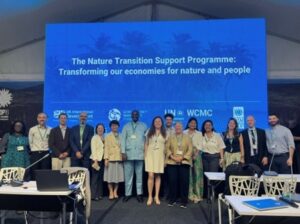The GCBC Research Grant Competition 3 (RGC3) Concept Note application window closing soon!
The GCBC Opportunities Portal for Concept Note submissions for the Third Research Grant Competition (RGC3) CLOSES at 23:00 hrs UTC, on Sunday, 16 March, 2025. Applications submitted after this date will not be accepted or considered for the full proposal stage.
The Opportunities Portal provides applicants with access to the Invitation to Apply Pack, a comprehensive range of resources to assist applications for RGC3 grant funding. Only applicants registered on the portal via www.gcbc.org.uk can access these essential documents and submit Concept Notes. Late applications submitted after this date will not be
Register Here
The two research themes of this RGC3 are:
- Theme 1: Using biodiversity to improve the climate resilience of agricultural, food and bioeconomy value chains – Transforming agrifood systems at scale to incorporate nature-based solutions that build biodiversity back into production landscapes to boost climate resilience and reduce poverty (open to all GCBC focus regions).
- Theme 2: Biodiversity hotspots in Small Island Developing States (SIDS) – Building sustainable businesses from nature to adapt to climate change, protect biodiversity, and tackle poverty (focused in SIDS).
Following the assessment of Concept Notes, successful applicants from this first round will then be invited to submit Full Proposals for their proposed projects which align with the RGC3 themes.
The GCBC, a UK Official Development Assistance (ODA) programme funded by the Department for Environment, Food and Rural Affairs (Defra), aims to fund a mixed portfolio of up to twenty grants in RGC3, covering a range of topics and geographies across both themes. Grants sums of between £100,000 and £1 million are offered for projects of 12-36 months duration.
The GCBC will accept applications for projects with activities in GCBC-eligible countries in Latin America (including Central America), the Caribbean, Sub-Saharan Africa, and South-east Asia and the Pacific and Small Island Developing States. A list of GCBC eligible countries is available below in the Resources section. To be accepted for funding under the GCBC programme projects must demonstrate:
- Fit to GCBC: All proposals need to address poverty alleviation and climate resilience, focusing on approaches that better value, protect, restore and sustainably manage biodiversity.
- Fit to theme: Proposals must address research questions within one of the themes set out above.
- GESI: All proposals must incorporate clear plans to factor in gender, equality and social inclusion from the outset.
- R&D: Proposed work must meet the definition of research and development: creative and systematic work undertaken to increase the stock of knowledge – including knowledge of humankind, culture and society – and to devise new applications of available knowledge (OECD, 2015).
Resources for RGC3 Applicants
A series of webinars to provide supporting information for Concept Note applications for RGC3 were recently completed.
Watch the Webinars here:
The GCBC has produced several resources to assist applicants for RGC3 funding:
Download the List of GCBC Eligible Countries here
Download the RGC3 Theme Paper here
Download Frequently Asked Questions (FAQs) here
Download the Invitation to Apply Overview here
Download the GCBC Research Strategy here
Don’t forget! The deadline for Concept Note applications is fast approaching. Act now, or you might miss the opportunity to secure RGC3 funding for your project.







